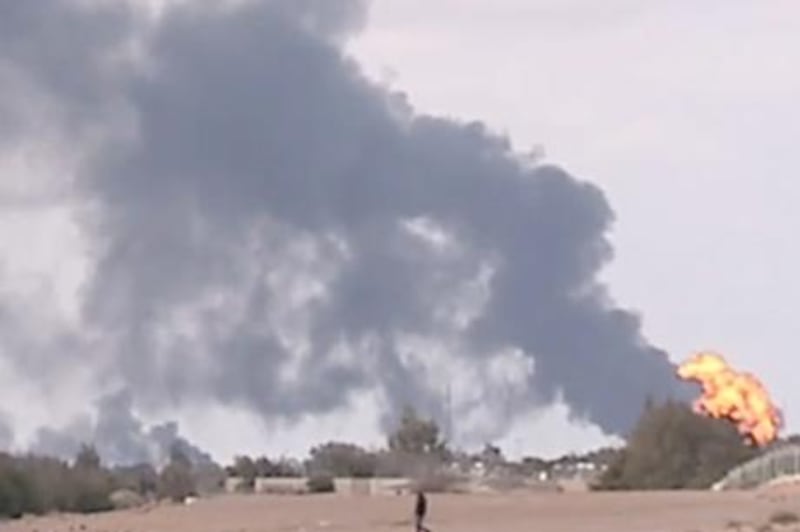RAS LANUF // The Libyan government and rebels fighting against Muammar Qaddafi accused each other of blowing up oil facilities in the east of the country today.
The rebels said Colonel Gaddafi's forces had hit an oil pipeline leading to Es Sider and dropped bombs on storage tanks in the Ras Lanuf area.
Libyan state television blamed the explosion on "al Qa'eda-backed" armed elements who had blown up an oil storage tank as pro-Qaddafi forces advanced into Ras Lanuf.
A rebel official in Benghazi accused Colonel Qaddafi of playing a "dirty game" by hitting pipelines. Huge blasts rocked the Libyan rebel-held oil town of Ras Lanuf Wednesday, sending flames leaping hundreds of metres into the sky, as fighting raged with government troops.
A series of powerful explosions went off near an oil facility as forces loyal to Colonel Qaddafi rained artillery shells on rebel positions five kilometres west of the town, an AFP reporter said.
The explosions just outside Ras Lanuf erupted into fireballs and a mechanic said a pipeline had been blown up.
Ali al Aguri, an oil company mechanic who works at another plant further away from the As Sidra facility, said: "I know for sure that what they blew up was an oil pipe. I know the whole line by heart."
Every few minutes, another ball of flames shot up into the sky. A constant inferno of fierce flames could be seen at the foot of the cloud of black smoke.
From a distance, the facility appeared to be a set of low beige buildings with a water tower and a communications tower.
Soon after the blast, a Libyan warplane carried out an airstrike about a kilometre away towards the Mediterranean coast. It was not immediately known if there were any casualties or damage.
Earlier at least 20 shells fell near a rebel checkpoint west of Ras Lanuf, AFP reporters said, adding there were no immediate reports of casualties.
The rebels retaliated by firing some 40 Katyusha rockets from launchers mounted on two trucks as well as two anti-aircraft missiles, the reporters said.
One of the missiles struck a telephone relay antenna some two kilometres away, while huge clouds of black smoke could be seen about 10 kilometres further west, suggesting they had hit a more distant target.
One of the rebels marked the moment by playing a revolutionary song full blast on a loudspeaker, with lyrics which said: "We will stay here until the pain is over."
Earlier both rebels and pro-Qaddafi forces dug into defensive positions between Ras Lanuf and government-held Bin Jawad, some 30 kilometres to the west, in eastern Libya.
An AFP reporter saw some 200 rebel fighters spread out on small hills around the main coastal road.
Rebel colonel Masud Mohammed told reporters some five kilometres from Ras Lanuf: "Today, we have established defensive positions ahead of here."
"Qaddafi's forces are in Bin Jawad, they are occupying the mosque and the school," he said. "Today we are not attacking yet."
He also said there were four airstrikes by government warplanes near Bin Jawad earlier today. Several rebels were wounded, he said, but gave no further details.
The colonel said "heavy shelling" on Tuesday had pushed back the lightly-armed rebel fighters as they advanced towards Bin Jawad, which the inexperienced insurgents had entered on Sunday but failed to hold after being ambushed by pro-Kadhafi militia.
Rebels then moved the reporters back, saying it was not safe to stay.
The rebels earlier said their own forces were 20 kilometres west of Ras Lanuf, while the government troops had not moved from Bin Jawad, where a rebel spokesman said Tuesday they had dug themselves in.
At the last checkpoint a letter from Libyan Muslim scholars was read aloud through a megaphone, expressing support to the fighters, but urging them to be disciplined.
"Follow orders, obey the commanders in the field, do not make chaotic movements," the letter read.
The speaker then shouted to the rebels, "Guys, disperse."





